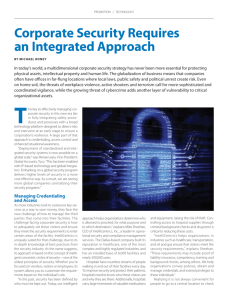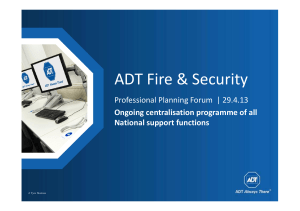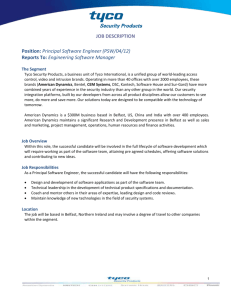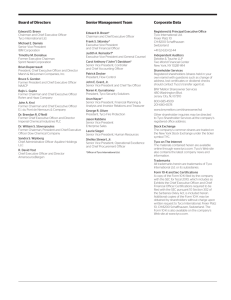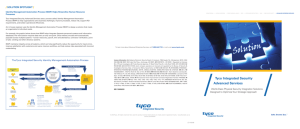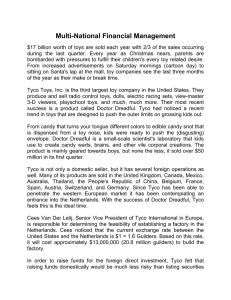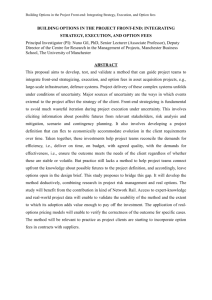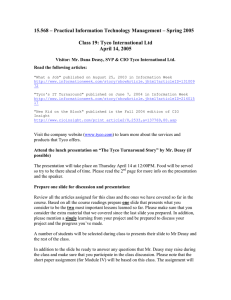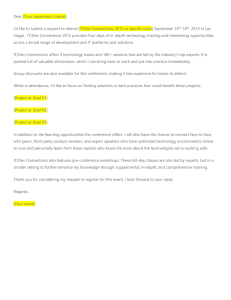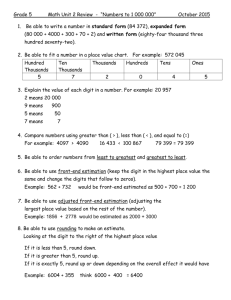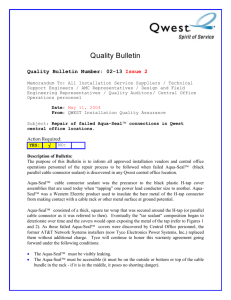product design and development
advertisement
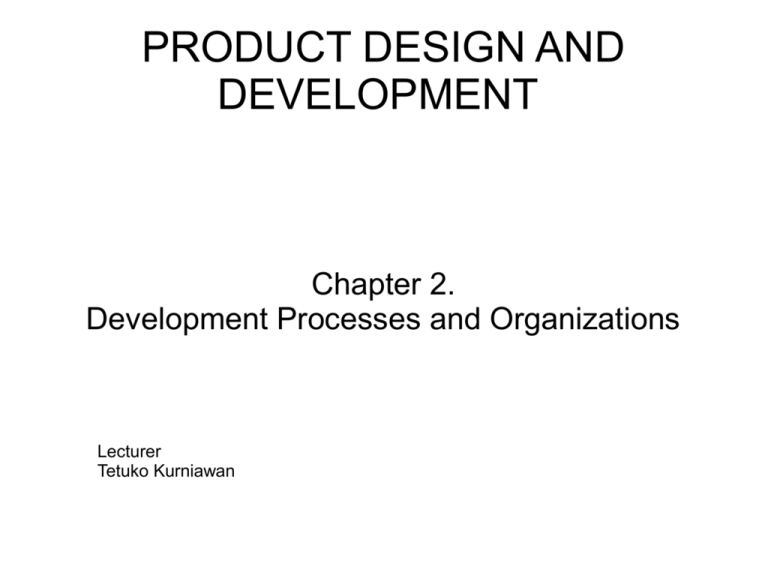
PRODUCT DESIGN AND DEVELOPMENT Chapter 2. Development Processes and Organizations Lecturer Tetuko Kurniawan OUTLINE ● The Product Development Process ● Concept Development: The Front-End Process ● Adapting the Generic Product Development Process ● Product Development Process Flows ● The Tyco Product Development Process ● Product Development Organizations ● The Tyco Product Development Organzation Tyco International Tyco Internation is a leading manufacturer of sensors and controls Tyco International ● ● They wanted to establish a common product development process structure that accepted by many different operating divisions Organization for product development that would allow tyco to compete effectively in a variety of competitive business markets Tyco's questions: * what are the key product dev. Activities that must be included in every project * What project milestones and review gates can be used to manage the overall development process by phases? * Is there a standard dev. Process that will work for every operating division? * what role do experts from different functional areas play in the development process * How and what organization form? The Product Development Process ● ● ● Product Dev. Process is the sequence of steps or activities that an enterprise employs to conceive design and commercialize a product. Many of the steps are intellectual/organizational rather than physical Every organization employs a process at least slightly different from that of every other organization The Product Development Process ● A well defined development process is for the following reasons: – Quality Assurance → act as checkpoint along the way of process – Coordination → defines roles of each players. – Planning → milestones and schedule – Management → assessing the performance of an ongoing development process – Improvement → careful documentation and ongoing review of a development process may help to identify opportunities for improvement The Product Development Process ● P.D. Process: initial creation of a wide set of alternative product concepts and then the subsequent narrowing of alternatives and increasing spec. of the product until the product can be reliably and repeatably produced. The Product Development Process ● ● P.D process is an information-processing system. Begins with inputs: corporate objectives, strategic opportunities, available technology, product platform, production systems. P.D process: risk management system. As the process progresses, risk are reduced as the key uncertainties are eliminated and functions of the product are validated The Product Development Process ● 6 generic product development process 0. Planning Begins with opportunity identification guided by corporate strategy, assessment of technology development and market objectives. Output: project mission statement which specify target market of the product, business goals, key assumptions and constraint 1. concept development The need of target market are identified, alternative product concepts are generated and evaluated, one or more concepts are selected for further dev. Testing 2. System-level design Definition of product architecture, decomposition of the product into subsystems and components and preliminary design of key components. Output: geometric layout of the product, a functional specification, preliminary flow process for assembly The Product Development Process ● 6 generic product development process 3. Detail design Detail design phase: complete specification of the geometry, materials and tolerances of all the unique parts. Identification of all the standard parts to be purchased. Output: control documentation for the product → drawing/files containing geometry of part and production tooling, spec of the purchased part, process plans for the fabrication and assembly. 4. Testing and refinement Construction and evaluation of multiple pre production versions of the product. Testing of alpha prototype (not necessary fabricated with actual process) and beta prototype (fabricated with actual process, but not assembly). Output: engineering changes? 5. Production ramp-up Product is made using the intended production system. Purpose is to train the workforce and to work out any remaining problems in the production processes. Product may be given to the customer. Usually post launch project review Concept Development: The Front-End Process The Front-End Process The front-end process may overlapped in time and iteration is often necessary dashed arrows: uncertain nature of progress in product development. At almost any stage, new information available & results learned can cause the team to step back to repeat at earlier activity before proceeding. → iteration The Front-End Process ● Identifying customer need to understand customer needs and to effectively communicate them to the dev. Team. (Chapter 5) ● Establishing Target Specifications Spec. provide a precise description of what a product has to do. It is a translation of customer need in technical terms. Specs are set early in the process as the target for the dev. Team. Specs then may be refined by the team. The output is a list of target specification (chapter 6). The Front-End Process ● Concept generation the goal is to thoroughly explore the space of product concepts that may address the customer needs. It includes a mix of external search, creative problem solving within the team and systematic exploration of the various solution. The results is usually a set of 10 to 20 concepts (sketch and text). (chapter 7) ● Concept selection concept selection is the activity in which various product concepts are analyzed and sequentially eliminated to identify the most promising concept(s). (chapter 8) The Front-End Process ● Concept testing one or more concept are then tested to verify that the customer needs have been met, assess the market potential of the product, and identify any shortcomings. If the customer response is poor the project may be terminated or some earlier activities may be repeated as necessary. ● Setting final specifications the target specifications are reviewed after a concept has been selected and tested. At this point, the team must commit to specific values reflecting constraint, limitations and trade- offs. The Front-End Process ● Plan Downstream Development The team creates a detailed development schedule, devises a strategy to minimize the development time, and identifies the resources required to complete the project. The result is a contract book which contains the mission statement, the customer needs, the details of the selected concept, the product specifications, the economic analysis of the product, the development schedule, the project staffing and budget (chapter 18) The Front-End Process ● Economic analysis Economic analysis is shown as one of the ongoing activities in the concept development phase. It is performed before the project begins and updated as more information become available. Usually with the help of financial analyst. ● Benchmarking of competitive products understand the competitive products is critical to successful positioning of a new product. ● Modeling and prototyping every stages of the concept development process involves various forms of models and prototypes. early “proof of concept” models, “form only models”/mock up, spreadsheet models of technical trade-offs, experimental test models. Adapting the Generic Product Development Process ● ● The dev. process we discussed previously is generic or “market-pull” situation Depends on the unique context of the firm and challenges of specific projects, there are many different process: – Generic (Market-Pull) Products – Technology – Push Products – Platform Products – Process-intensive products – Customized products – High-Risk Products – Quick-Build Products – Complex Systems Adapting the Generic Product Development Process Adapting the Generic Product Development Process Product Development Process Flows Product Dev. Process follows a structured flow of activity and information. Three Process flow diagrams: Market pull, technology-push, platform, process-intensive, customized, and high risks products. Each stage is followed by review (gate) Quick built products: repetition of detail design, prototyping and test activities Product Development Process Flows Parallel stages of work on the many subsystems and components The Tyco Product Development Process ● ● ● ● ● Tyco is a primarily a market-pull enterprise Competitive advantage: highly effective marketing channels worldwide, strong brand recognition, a large installed base of equipment and an ability to integrate new technologies to its product lines. Products components fabricated with conventional process such as molding, machining and electronic assembly. Products are generally customized for a particular customer in the final sales and installation processes Primarily aimed at creation of new models of products rather than at the customization of existing models. The Tyco Product Development Process Tyco Rally Point process flow: Fundamental process product development Process activities RP = rally point, critical review to gain approval to proceed to the next phase Product Development Organizations ● ● ● In addition to creating an effective development process, successful firms must organize its development staff to implement the process in an effective manner Organizations Are Formed by Establishing Links among Individuals – Reporting Relationships: reporting relationships give rise to the classic notion of supervisor and subordinate. Formal links refer to organization chart. – Financial arrangements: Individuals are linked by being part of the same financial entity, such as business unit or department within a firm – Physical layout: Links are created between individuals when they share the same office, floor, building, or site. These links are often informal. Any individual may be linked in several different ways to other individuals. Product Development Organizations ● ● Organizational Links May Be Aligned with Functions, Project or Both Particular individuals can be classified according to their function and according to the projects they work on. – A function: area of responsibility involving specialized education, training, or experience. Example: marketing, design, manufacturing, market research, market strategy, stress analyst, industrial design, – A project: a person apply their expertise to specific projects Product Development Organizations ● ● Functional organizations: organizational links are primarily among those who perform similar functions Project organizations: organizational links among those who work on the same project Product Development Organizations Functional organization ● ● ● Consist of groups, each groups consisted of similar expertise individuals Example Marketing group, engineer group Each member involves in different projects but there would be no strong organizational links to other members of each project team ● ● ● ● Project organization Groups of people from several different functions, each group focus on particular product/project Lead by experienced project manager New ventures, start-ups , the growth of new company. President/CEO can be viewed as the project manager Product Development Organizations ● ● ● ● Matrix organization: hybrid of functional and project organizations. Each individuals has two supervisors: one project manager and one functional manager. In reality: either the functional or the project organization tends to dominate Two variant: heavyweight project organization and lightweight project organization. Product Development Organizations Lightweight project organization ● ● ● Heavyweight project organization Stronger functional links ● Project manager: coordinator and administrator, i.e. update schedules, arranges meeting, and facilitates coordination, has no real authority and control in the project organization ● Functional managers: budgets, hiring, firing, and performance evaluation ● ● Strong project links Project manager has complete budge authority, is heavily involved in performance evaluation of the team members Functional mangers have little authority and control IPT (integrated product team), design built team (DBT), product development team (PDT). Product Development Organizations ● ● ● ● Choosing an Organizational Structure Functional organizations: specialization and deep expertise in the functional area Project organization: enable rapid and effective coordination among diverse functions. Four considerations: – How important is cross-functional integration? – How critical is cutting-edge functional expertise to business success? – Can individuals from each function be fully utilized for most of the duration of a project? – How important is product development speed? Product Development Organizations Product Development Organizations ● Distributed Product Development Teams ● Reasons: – Access to information about regional markets – Availability of Technical expertise – Location of manufacturing facilities and suppliers – Cost saving through lower wages – Outsourcing to increase product development capacity The Tyco Product Development Organization Each of them has their own functional managers The Tyco Product Development Organization ● ● ● ● ● Originally functional organization structure: great functional skills, sacrifices some project efficiency. Project leaders only indirect control of the functional resources assigned to their team Change → project leaders who know the Rally Point process and how to coordinate the activities across functions. Lead to very good product development performance while maintaining very strong functional capabilities Created regional engineering centers at locations in high growth markets such as China and India. CREATIVE PROJECT “Learning by doing” ● ● ● ● Continuing last week assignment: How would you defined the development process in your team? explain the type and the process flow Sketch and explain the most suitable organization structure for your development team. Discuss with your team. Presentation!
